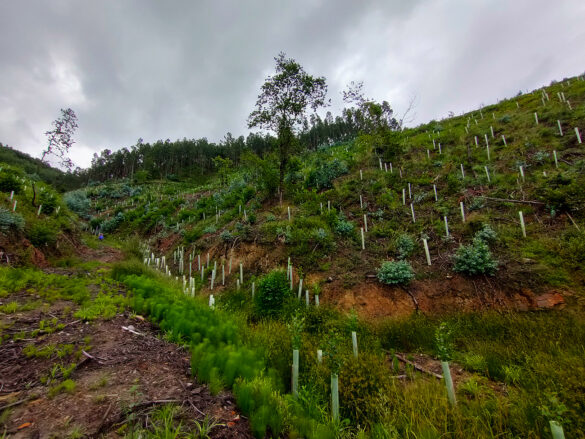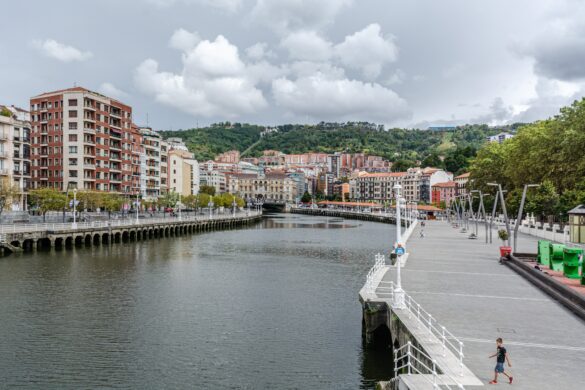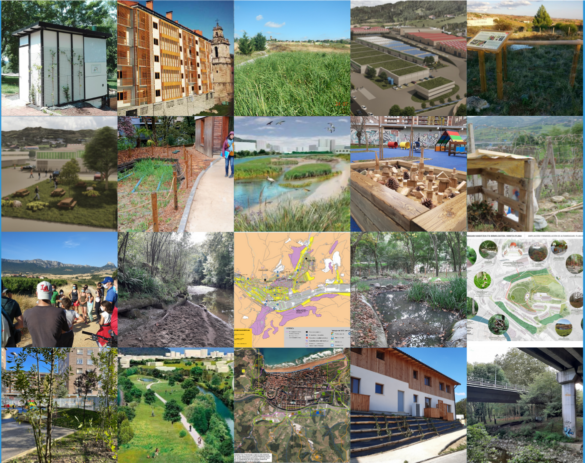The Basque Country is a densely populated small region of 7,000 square metres, home to over 2 million inhabitants. With a large amount of people in a relatively small space, where 70% of the population live on the coast, the main impacts of climate change include rising sea levels, flooding, displacement of natural habitat, stress on available water resources at certain times of year and heat waves, with heat island effect in built-up areas.
From the Basque Government’s 2015 Climate Change Strategy 2050:
Mitigation: 40% below 2005 levels by 2030. 80% below 2005 levels by 2050. 40% renewable energy. Adaptation: Ensure resilience of Basque territory.
The Climate Change Strategy of the Basque Country
The Basque Government set targets in its 2015 Climate Change Strategy 2050. Emissions reductions targets of 40% below 2005 levels by 2030 and 80% on 2005 levels by 2050 were set. The strategy also aims to generate 40% of the territory’s energy with renewable sources and to ensure the resilience of the Basque Country to the impacts of climate change.
The Klima 2050 instrument set out 9 goals and a plan of action up to 2020 with 70 measures to direct action to address adaptation. All Ministries of the Basque Government share it. It will demonstrate how well coordinated climate plans and strategies can be implemented across an entire territory with over 2 million inhabitants, across a multi-level administration network. One of the main objectives of the strategy is to radically increase the resilience of the Basque Country to climate change.
All the ministries of the Basque Government have been involved in defining and drafting the strategy in order to integrate all the climate change sectoral policies into a single planning instrument. They will all be responsible for implementing it in their respective policy areas. The KLIMA 2050 strategy has been designed as a crosscutting tool of the Basque Country and is closely linked with the three provinces and their municipalities.
The strategy is based around 5 key themes:
- Mainstreaming action
- Exemplary administration
- Innovation and opportunities
- Zero emissions culture
- Transformative knowledge
In the first 5 years, to 2020, 70 actions will be implemented as the first steps towards reaching the 2050 objectives. The plan will be reviewed and updated every 10 years to take account of developments and to reflect on new information.
The Strategy is aligned with the budgetary-economic forecast of the Government and it will include the measures to be undertaken in its powers of action. 2015 benchmarks are used to provide an anchor that can account for long-term uncertainty. The total budget related to climate change, estimated for 2016, stands at €84,538,078. This is not resource set aside exclusively to implement the strategy to 2050, but more the total budgetary requirements of the series of sectoral actions related to climate policy. The estimated operating budget for the correct implementation of the Strategy stands at €439,939,552, divided over the years of the Roadmap 2020.
The measures to be implemented between 2015 and 2020 are expected to generate €57 million of economic activity in the Basque Country, which would be associated to 1,030 “gross” total jobs being created each year over the coming 5 years. The annual energy invoice could be cut up to €55 million per year and the harm avoided to health due to air pollution reduction is also estimated to be between €12 and 32 million per year.
The 9 goals of KLIMA 2050 include commitments to low carbon energy, zero emission transport, increasing territorial efficiency and resilience, natural environment resilience, primary sector resilience, reducing waste and anticipating risks. They also include the goal to make the Basque public administration an exemplar of responsible action on climate change.
The Basque Government’s Ministry of Environment and Territorial Policy leads the coordination and driving of this “Climate Change Strategy of the Basque Country to 2050” with the support and impetus mainly from the Ministries of Economic Development and Competitiveness (Industry Office) and of the Treasury and Finances (Economy and Budget Office). The Environmental Planning and Natural Environment Directorate (Environment Office) is tasked with supporting this Strategy.
KLIMA 2050 is an umbrella benchmark for all sectoral plans and policies across the Government that have an impact on climate change. It draws together existing policy and programmes under a single vision and aligns all future effort at the state and local level towards mitigating and adapting to climate change. It sets a 35-year timeframe and in doing so, is an embodiment of the ‘climate change mainstreaming’ that has been discussed in Europe for a decade. All activities will have a climate consideration, regardless of which part of government it is coming from.
KLIMA 2050 has been featured on the Sustainable Cities Platform transformative actions database and the Transformative Actions Platform, highlighting the novelty and ambition of the Basque Country’s plans.
Plans for the future
Monitoring reports are going to be produced every 2 years; beginning in 2017, progress towards achieving the targets and details of the policies and programmes that have been initiated to meet the goals will be outlined. Each one of the actions will have its detailed datasheet indicating associated budget in the management plans of the departments involved to foster its implementation and ongoing monitoring.
Interim assessment reports will also be produced every 10 years from 2020. They will be prepared by an external and independent entity following the criteria of transparency, participation and cooperation.
The Climate Change profile of the Basque Country 2018 states that 45% of the action plan for implementing KLIMA 2050 is in place. Goal 1 – concerned with creating a low carbon energy model for the Basque Country and goal 3 which relates to efficiency and resilience are currently the most well advanced in terms of implementation.
52 tips to combat climate change was a report published in 2018 aimed at encouraging behaviour change and providing information about how daily practices can be adjusted in order to reduce emissions.






